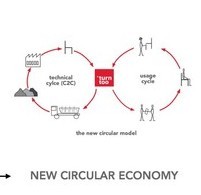
Thomas Rau, founding father of Turntoo, is committed to turn the world from consuming products to using product service offerings. It is the only real way to deal with scarcity of resources. He sees the world ripe to make the step from owning a product to paying for performance. For example not paying for a lamp but paying for light. The concept is familiar to people working in offices where the business doesn’t own a copier anymore but pays per print and the copier stays property of the producer, or car lease contracts where you pay for 30.000km a year and not for the car. After the contract the product can be taken apart, components re-used and materials recycled and used in new products for services.
Turntoo works together with Steelcase, Desso and Philips ao.
So in short:
Consumption by usage: With ®turntoo products are not consumed but used. Within ®turntoo the user will not be the product owner. The user only borrows the suitable raw materials in form of a product from the manufacturer and can make use of the performance: it is performance that counts.
From product to service: The user only pays for the service that supplies the product and not the product itself. He buys light instead of lamps, heat instead of a boiler, etc.
Products become “commodity banks”: The producer retains the ownership of the materials and thus remains responsible for the product and for taking back the product into the materials cycle after its particular usage. For producers it is important to design and produce the product in such a way that it can be fully disassembled so that the raw materials remain accessible for future generations of products (Cradle to Cradle). The producer will be held responsible for the consequences of his own actions.
From short to long life performance cycle: Because the user only pays for the provided service it will be important for producers to make quality products with a long performance cycle without any need of repair or replacement.
Socially responsible consumption and production: By the change from consumption to use, in other words by the change to socially responsible consumption, the way of designing & manufacturing also changes automatically. Each product becomes a “resource depot” in such a way that consuming and producing have no more adverse effects.

Comments by our Users
“http://forum.susana.org/forum/categories/62-wg-9-business-awareness/3075-qturntooq-as-a-profitable-business-model-for-qresource-securing-sanitation-systemsq-aka-ecosannass#3164”
“May I lay out to you my rather lengthy thoughts on the subject, I tried to start up a controversial discussion on http://forum.susana.org/forum/categories/62-wg-9-business-awareness/3075-qturntooq-as-a-profitable-business-model-for-qresource-securing-sani”
“Dear MS Visser,
Thanks for your thoughts on the subject. The people from TurnToo have the guts to go for the trouble of complexity, I guess they know what they may go for. Some one have to start to re-thinking and maybe thinking the other way around. Ma”
“There are some biological cycles possible as well. Bill & Melissa Gates have a sanitation project running where refuse is split chemically in energy, water and phosphates”
“What about "biological cycles" (consumed biological raw-materials) via TURNTOO in SANITATION?
E.g. Phosphate, Humus and Energy in food and in ("used") digested human and animal food (urine and faeces in human and animal sanitation). In near future Agric”
“As fare I understand, the profit margin + costs + risks share involved for the "Raw-material- SERVICE-Provider" is paid by the Producer only & very direct and is near equal to the amount the customer paid less during the purchase of product. To start prod”